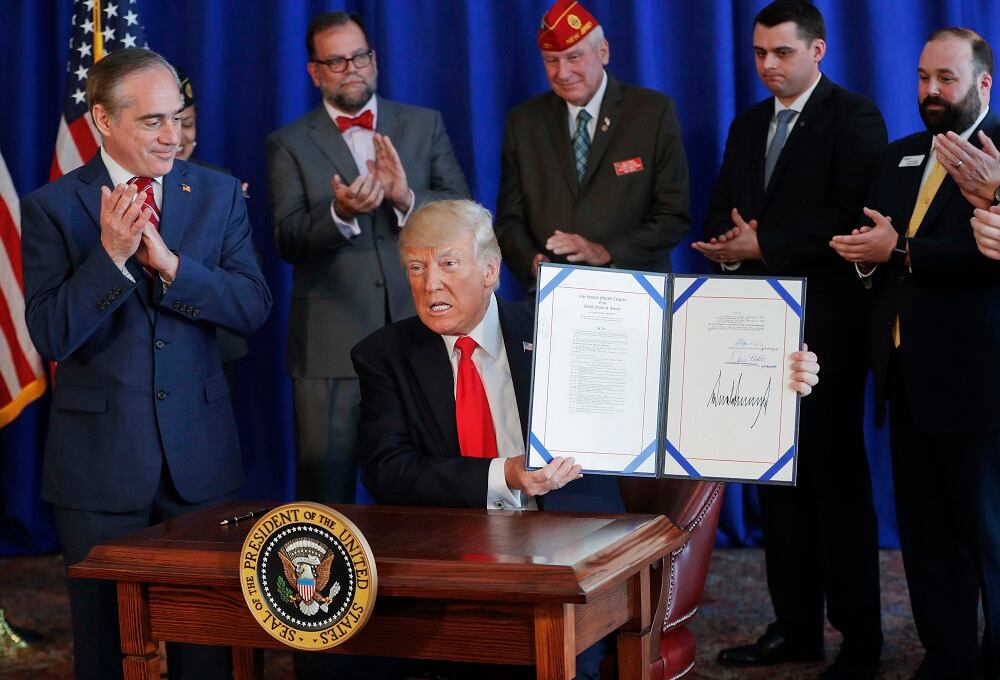WASHINGTON — For the second time in less than a year, a controversial Veterans Affairs health program is just weeks away from running out of money and disrupting care for thousands of patients.
And, for the second time over that span, lawmakers hoping for sweeping changes to VA health operations are scrambling to balance their long-term solutions with a short-term funding headache.
At issue is the Veterans Choice Program, which allows some veterans to receive private-sector care paid for with taxpayer dollars. The program is restricted to veterans who live 40 miles from the nearest VA facility or face a 30-day wait for care there, and has been at the center of debates over how to best deliver medical care to ailing veterans.
Twice this year Congress has intervened to prolong the program, first in April to remove a later-summer expiration date for the funds, then in August to add $2.1 billion to keep the program solvent through the fall and winter.
On Tuesday, VA Secretary David Shulkin officially informed lawmakers that he expects the program to run out of money sometime in the next month. He is requesting yet more intervention from Congress.
“Nearly 1.9 million veterans have sought care through the VCP since its implementation (in 2014),” he wrote in a letter to congressional leaders. “Unless additional funds are provided, veterans using the current VCP will be less able to access timely health care as close to their homes as possible.”
Shulkin had warned as far back as August that VA would face a new funding shortfall at the start of 2018, and lawmakers used that warning as an impetus for a series of sweeping new VA health care reform proposals currently pending on Capitol Hill.
The furthest along is a measure sponsored by Senate Veterans’ Affairs Committee Chairman Johnny Isakson, R-Ga., which would add $4 billion in bridge funding to the Choice program but eventually replace it with a new community care initiative that would provide easier access to non-VA medical appointments for veterans.
This week, Isakson urged his congressional colleagues to quickly advance the measure, either as a stand-alone bill or as part of ongoing appropriations discussions on Capitol Hill.
“It is critical that we pass this bipartisan legislation before the end of the year to ensure veterans continue to have access to efficient, timely and quality health care,” he said in a statement “(The bill) makes much-needed improvements to the community care programs offered by the VA and helps ensure that our veterans continue to get the very best care when and where it makes the most sense for them.”
He has the support of Democrats from his committee (he co-wrote the measure with committee ranking member Jon Tester, D-Mont.) and a host of veterans groups. Shulkin has generally backed a series of reform proposals pending in Congress, including Isakson’s measure.
But the measure’s price tag, which the Congressional Budget Office says tops $54 billion over five years, has raised concerns among House members.
And two other prominent Republican senators — Jerry Moran of Kansas and John McCain of Arizona — have offered their own legislation as both and alternative and a roadblock, arguing the Isakson bill doesn’t go far enough to overhaul VA systems.
“Spending must be accompanied by real reforms that result in better care for veterans,” Moran said Wednesday. “The status quo is not sufficient. The challenges faced by veterans are not the result of a lack of resources, but a problem of management and unnecessary bureaucracy at the VA.”
At the same time, Senate and House negotiators are also working on a broad budget deal to finalize appropriations for all of federal operations for fiscal 2017, in hopes of avoiding a government shutdown later this month.
If the sweeping health care changes aren’t finalized before Congress’ holiday break next week — a potentially difficult legislative path, given major tax reform measures also under consideration in the next few days — appropriators could include more short-term funding for the Choice program in their budget bills.
Last week, Shulkin said he would be open to “a short-term, very limited extension of funding for the existing (Choice) program to allow sufficient time for a final agreement to come together” on the larger reforms.
But it’s unclear if Democrats will go along with that plan. Tester told reporters on Wednesday that he wants a full-year budget for VA and the Isakson bill passed before the end of the year.
“If the goal here is just to keep kicking the can down the road, we’re not in favor of that,” he said. “We need to fix VA.”
Shulkin warned in his letter Tuesday — and similarly in a letter over the summer — that allowing the Choice funding to lapse without a fix would result in “decreased access to care, damaged community partnerships and interrupted care continuity for veterans.” Those patients could not all be covered by other VA care options, he insisted.
House lawmakers have been unable to move their less expensive, less expansive community care bill out of committee in recent weeks. They’re expected to recess for the year by Dec. 22.
That leaves congressional leaders about a week to figure out how to deal with the latest VA care crisis, or to decide to delay a decision to January and face a potentially even larger problem then.
Leo covers Congress, Veterans Affairs and the White House for Military Times. He has covered Washington, D.C. since 2004, focusing on military personnel and veterans policies. His work has earned numerous honors, including a 2009 Polk award, a 2010 National Headliner Award, the IAVA Leadership in Journalism award and the VFW News Media award.





